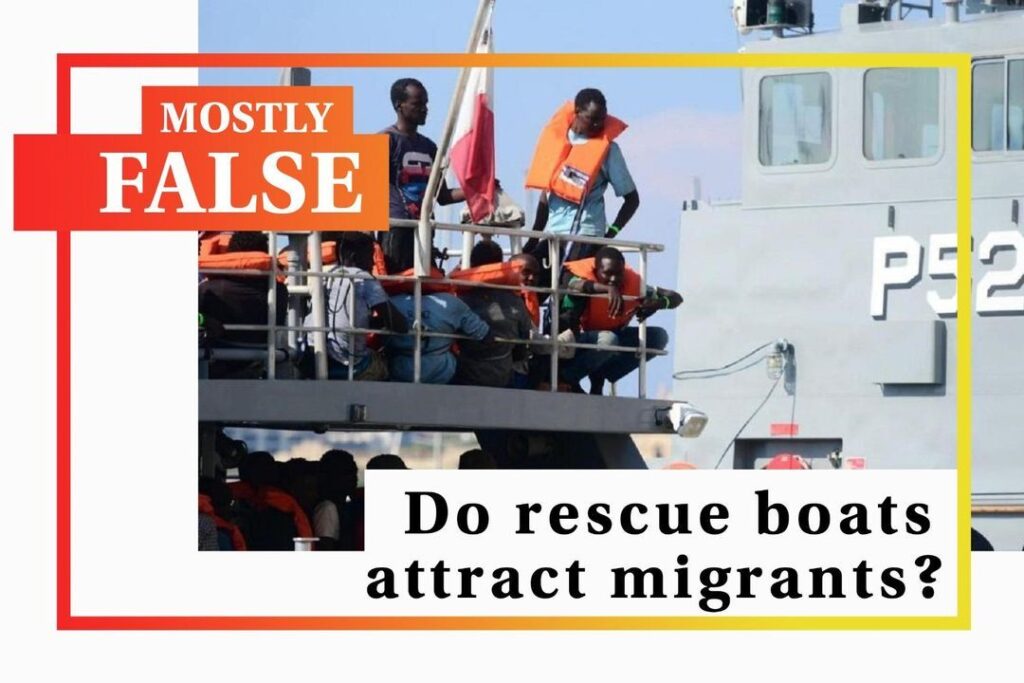Home Affairs Minister Byron Camilleri last week pointed to a widespread claim that the presence of NGO search and rescue (SAR) operations near Libya is a pull factor for migrants hoping to cross the Mediterranean Sea into Europe.
This claim was made in the wake of a new decree issued by the Italian government that requires rescue ships to immediately sail to port after a rescue rather than seek out more people in distress.
Some 20 SAR operations criticised the decree, arguing that it will “impede rescue operations and put people who are in distress at sea further at risk” and goes against a UN convention that obliges a captain to “render immediate assistance to people in distress”.
But Camilleri said that he could understand Italy’s position. “Many say that NGOs are a pull factor,” he told reporters. “What Italy is doing is aimed at preventing NGOs from being a pull factor”.
The claim has indeed been made before and by reputable agencies.
Frontex, the European Border and Coast Guard Agency, said in a 2017 report that “border surveillance and SAR missions close to, or within, the 12-mile territorial waters of Libya […] influence smugglers’ planning and act as a pull factor”. In analysing rescue operations throughout 2016, Frontex found that an increasing number of operations were being carried out without a prior distress call or formal notification of the boat’s location, leading to suspicions that smugglers were using the presence of NGOs to their benefit.
This belief has also often been cited as a key reason why Italy’s humanitarian operation Mare Nostrum Operation was discontinued in 2014.
Does the presence of NGO search and rescue operations really serve as a pull factor for migration?
If this claim were to be true, we would expect to see more migrant crossings at times when there is higher NGO search and rescue activity. Most studies suggest the opposite is the case.
A Migration Policy Centre analysis of migratory flows from Libya to Italy between 2014 and 2019 found that “non-governmental SAR operations do not correlate with the number of migrants leaving Libya by sea”. The study noted that although the percentage of migrants rescued by NGOs rose dramatically between 2014 and 2015 (from 0.8% to 13%, indicating far greater NGO activity), the overall number of migrant crossings during this period decreased. Similarly, migrant crossings from Libya also decreased after 2017, when NGOs became the sole provider of SAR operations, suggesting that the presence of NGO ships has little effect on migrant crossings.
The study also tracked SAR missions throughout 2019, finding that there was no significant change in the number of crossings between days when NGO boats were in operation carrying out rescue missions and days when the Libyan Coast Guard was active to intercept migrants and take them back to Libya. Generally, the study found that other factors, such as political conditions within Libya and meteorological conditions were found to have a far greater impact on the number of people attempting the crossing.
This is supported by research from the University of Pisa and University of Oxford which compared periods of high SAR activity (the Mare Nostrum operation between 2013 and 2014 and the Triton II operation between June 2014 and December 2016) to an intervening period of low SAR activity (the Triton operation between 2014 and May 2015). The study found that numbers of migrant crossings tend to be higher during periods in which SAR activity is low. On the other hand, periods of low SAR activity were characterised by high death rates of migrants attempting the crossing, suggesting that although NGO ships do not incentivize migrant crossings, they do make them safer.
A recent study by researchers in Germany extended a similar analysis over a longer period period of time, analysing migrant crossings to Malta and Italy since 2010 through to the coordinated pushback in 2020, seeking to understand whether the different forms of SAR operations throughout this period had any impact on the number of crossings. The study concluded that there was no substantial change observed and that “search-and-rescue is not a further causal driver of migration and does not incentivize more crossings”.
Other, earlier, studies also came to similar conclusions. A study carried out by the Forensic Architecture agency at Goldsmiths College found that an increase in migrant crossings since 2016 were the result of worsening social and economic conditions across several African countries, “not the product of the supposed ‘pull-factor’ constituted by SAR NGOs”. Likewise, a Médecins sans Frontières analysis found that attempted sea crossings rose by a negligible 1.6% since the increased involvement of SAR operations, suggesting that their presence had little impact.
In comparison, few studies reach the opposite conclusion, namely that the presence of SAR boats incentivises further crossings. One notable exception is a 2021 study into the unintended consequences of SAR operations which concluded that “they seem to have induced more migrants to attempt to cross”, calling on the EU to provide safe, legal migration paths from home countries to Europe.
What factors do affect the number of migrant crossings?
Research suggests that rather than the presence of NGO ships, migrant crossing rates are most sharply affected by so-called push factors. The most prominent push factor is the political and social situation in the migrants’ home countries, with worsening conditions dramatically increasing the rate of crossings across the Mediterranean.
Meteorological conditions are also a key factor, with the rate of migrant crossings decreasing sharply at times of poor weather.
Recent political agreements between border countries, such as those between Italy and Libya in 2017 and Malta and Libya in 2020 have also significantly decreased the number of migrant crossings into Europe, as outlined by Camilleri himself in an opinion piece on Sunday. These agreements have raised concerns over potential human rights violations, with several human rights organisations calling for them to be rescinded.
Verdict
The claim that NGO ships act as a pull factor for migrants hoping to cross the Mediterranean cannot be dismissed outright, given the sensitive and incomplete nature of the data available. Likewise, the data presented by Frontex suggesting that smugglers are using the presence of NGO ships to their benefit cannot be discarded.
The overwhelming body of research into the topic, however, suggests that this is not the case and that the presence of NGO ships has little to no effect on the rate of migrant crossings. Furthermore, the research debunking this claim is based on a longer time series of data and more complex datasets, incorporating different periods of SAR operations and accounting for several other variables that may also be affecting the rate of migrant crossings.
This claim is therefore mostly false because the evidence generally refutes the claim, although some minor aspects may be accurate.
The Times of Malta fact-checking service forms part of the Mediterranean Digital Media Observatory (MedDMO) and the European Digital Media Observatory (EDMO), an independent observatory with hubs across all 27 EU member states that is funded by the EU’s Digital Europe programme. Fact-checks are based on our code of principles.
Let us know what you would like us to fact-check, understand our ratings system or see our answers to Frequently Asked Questions about the service.





